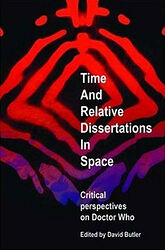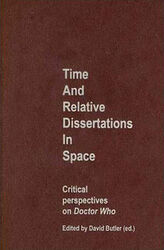 | Edition: | UK (paperback) | | | Released: | October 2007
| | | Publisher: | Manchester University Press | | | ISBN: | 978-0-71907-682-4 | | | Format: | paperback | | | Owned: | | | | Buy: |  |  | | New: | £15.99 | | Used: | £8.44 |  |
| | Prices as of 12 Jul 08:05 GMT |
  |  | | New: | $25.51 | | Used: | $28.82 |  |
| | Prices as of 12 Jul 08:05 GMT |
  |  | | New: | $36.95 |  |
| | Prices as of 12 Jul 08:05 GMT |
  |
Cover blurb:
Time and Relative Dissertations in Space takes the reader on a rich and varied study of one of the greatest television stories of all time: Doctor Who. Doctor Who has travelled an erratic path since it began in 1963, veering between respected institution and the source of countless jokes about low-budget visual effects. Yet, depite periods of hostile criticism and cancellation, the programme has survived to tell stories that span the breadth of space and time, returning to BBC 1 in 2005 as a revitalised family drama with huge popular and critical success. Time and Relative Dissertations in Space is the first study of Doctor Who to explore the Doctor’s adventures in all their manifestations: on television, audio, in print and beyond. Although focusing on the original series (1963-1989), the collection recognises that Doctor Who is a cultural phenomenon that has been told in many ways through a myriad of texts. Combining essays from academics as well as practitioners who have contributed to the ongoing narrative of Doctor Who, including Paul Magrs, Daniel O’Mahony, Lance Parkin and Dale Smith, the collection encourages debate with contrasting opinions on the strengths (and weaknesses) of the programme, offering a multi-perspective view of Doctor Who and the reasons for its endurance. With essays addressing core themes such as genre, narrative, authorship, visual style, music, sound, audiences, adaptations, and the portrayal of history on screen, Time and Relative Dissertations in Space will be of interest to those involved in the wider field of Television Studies as well as readers with a fascination and love for Doctor Who. David Butler is Lecturer in Screen Studies at the University of Manchester. | 


